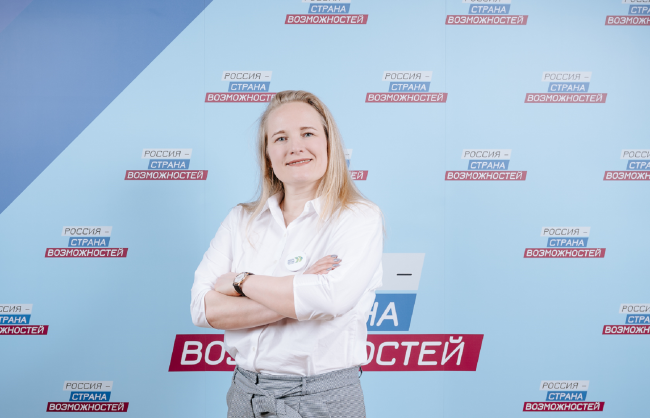Recall that at the end of March, under the chairmanship of the President of the Russian Federation Vladimir Putin, a meeting of the supervisory board of the ANO "Russia - a country of opportunities" was held, the participant of which was the vice-rector for development based on data analysis of VyatSU Ekaterina Mityagina, professor, doctor of sociological sciences, winner of the competition "Leaders of Russia. Science - 2020 ". During a conversation with the head of state, Yekaterina Mityagina drew attention to the need to develop regional universities - Vladimir Putin supported this idea.
What are the ways to achieve the goal of Russian regional universities entering a higher, including the world, level? Today Ekaterina Mityagina proposes one of them, presenting a model of a university consortium of scientific groups, which arose on the basis of real experience of interaction with colleagues from other universities. We are talking about the activities of VyatSU specialists as part of the University consortium of big data researchers, which the team of the largest university in the Kirov region joined in 2019. The consortium itself, initiated by Tomsk State University, was created two years earlier. During this short time, 30 participating universities, together with industrial partners, have implemented a significant number of large-scale research projects, accumulated valuable experience of effective cooperation. It was that experience that inspired Professor Mityagina to describe the network model of consortia as proven in practice, convenient for implementation and replication.
- It is no secret that we are dealing with an exponential growth in the volume of information and the speed of its updating, as a result of which not only data processing is difficult, but also the possibility of correctly setting tasks for managing any systems - in our case, scientific and educational and knowledge generation systems. Objects are so complex that it is impossible to pre-assign tasks and build cooperation within the framework of one educational or scientific institution. Hence, the primary goal of the consortium is the correct setting of tasks, -
thinks Ekaterina Mityagina.
An important factor is the new quality of the information space with its total digitalization, super-high-speed transmission capabilities - all this creates opportunities for the transition to distribution systems of cooperation.
- You no longer need your colleague to sit at the next table or in the next office - the restrictions associated with distance, bureaucratic burden, age and cultural differences are gone; transaction costs are reduced, subjective communication barriers are removed. The consortium is the medium for the removal of boundaries, -
this is how Ekaterina Mityagina defines another advantage of the proposed model. She continues:
- In the case of correct formulation of tasks within the framework of the consortium, prerequisites arise for discussing basic benchmarks when determining frontier values and alternative scenarios for achieving them. By creating a certain rational, well-equipped structure, for the first time, we get the opportunity to concentrate intellectual efforts, resources of people and teams, infrastructure and platform solutions when setting a problem, in order to find out where the forefront of science and research organization is now, what are the technological breakthroughs, what are the consequences fourth technological revolution. Consortium is a new quality of knowledge generation.
Speaking about the formation of a world-class agenda as the main task of consortia, E.V. Mityagina also emphasizes the need for regional concretization of strategies, taking into account the lightning fast obsolescence and disappearance of a number of professions. The key task in this case is the advanced training of personnel in relation to the moving frontier.
- The human capital of regional universities should not be thrown out into the streets. And here big data, new ways of processing information, algorithms, platform solutions, new opportunities from interaction with industrial partners can help. The main thing is to create an environment, to distribute the fields of responsibility and competence. Hence the new function of the consortium as a flexible system for the distribution of labor, -
explains Ekaterina Mityagina.
- In order for the research agenda in regional universities not to be equated with the defense of a Ph.D. dissertation, a controlled research interest is needed. At the same time, it is not controlled from above. The strength of consortia lies in the fact that they have an intellectually attractive core capable of shaping the agenda and highlighting a certain group of frontier values. Within the framework of the existing agenda, the field of problems and objects around the consortia becomes dynamic.
A prerequisite for starting a project is that a certain scientific community has complementary and related issues. The main thing is to competently decompose the problem so that each participant from different organizations has his own research interest. Each new community complicates the system of division of labor, introducing new problems and objects into it.
Such a model of interaction between universities, E.V. Mityagin, has great prospects:
- The consortium assumes openness, enabling the most effective collaboration, cooperation, communication. The network model allows universities, including regional ones, to set ambitious goals at the federal and global levels and successfully implement them. Regional universities have a real chance to enter the top international rankings with their scientific research.
Ekaterina Mityagina has already discussed ideas with her mentor - Minister of Science and Higher Education of the Russian Federation V.N. Falkov and colleagues, expressing gratitude to the Chairman of the Consortium Mikhail Myagkov, Director of the Center for Applied Big Data Analysis of NI TSU Vyacheslav Goiko, President of VyatSU Valery Yungblyud for support, help and fruitful cooperation.
Translated by Artemij Sizov

